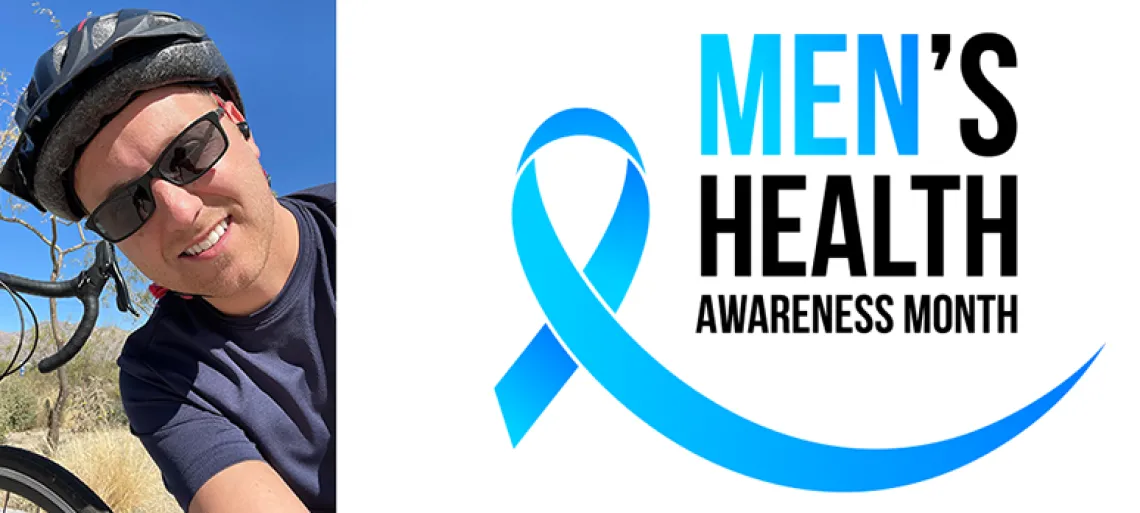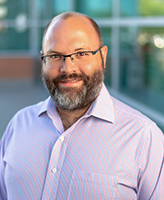Men's Health Month: Tune In and Take Care

Men’s Health Month is dedicated to actively encouraging men to get an annual check-up or seek help for mental health issues like depression, something men often avoid addressing*.
Life & Work Connections spoke with five University employees who identify as male and asked them how they care for their health and wellness. As they shared their stories, it become clear that even when they focused on one area of their health and wellness, such as their physical health, they reaped the benefits in other ways.
"What’s important is to take the time to focus on yourself and what will keep you running in the long-term,” Chad Myler, MS, CHES, health promotion manager for Life & Work Connections, says. “This includes regular check-ups, but it can also include eating well, going for a walk or hike and enjoying the outdoors, or keeping stress levels healthy through self-care or talking about your feelings with those you love and/or a professional.”

Syndric Steptoe

John Moeller

Joel Muraco

Eric Samboy

Eric Samboy
"My dad passed away when he was only 52 from a stroke and I had uncles that passed away at a young age," says Syndric Steptoe, director of player and community relations for Arizona Football. "That had a big impact on me and is the motivation for me to be more diligent and aggressive with my health and put my health at the forefront of my life."'
Growing up in Texas, Steptoe ate what was available to him – sometimes eating biscuits with syrup – and even as a professional athlete didn't pay much attention to what he was putting in his body. Working in athletics and having access to nutritionists and trainers, Steptoe is learning more about food and how it can impact the body.
"High blood pressure is something that runs rampant in my family and so I try to identify foods that will raise my blood pressure," Steptoe says. "So, it's been about learning that certain foods are going to give me energy, and certain foods are going to be negative for me."
Despite being a self-proclaimed cookie addict, John Moeller, director of the Academic and Research Technologies Group in the Department of Management Information Systems, understands the importance of staying active for the physical and social benefits.
"I've been playing pickup basketball for well over a decade with the same group of folks," Moeller says. "There's some built-in accountability because they often need you to be there just to get a game going, and that's got me out there even on days when I didn't feel like playing. I enjoy the social aspect as well, catching up with the guys between games and seeing their kids grow up."
For Joel Muraco, assistant professor of practice in the Norton School of Family and Consumer Sciences, he believes that just going outside – whether to be active or to enjoy the outdoors – helps in more ways than one.
"Getting outside helps me do a few things. It helps me disconnect from technology because I only use my phone to play music, not to be on social media and it helps me slow down," Muraco says. "I measure my productivity in how many steps I've taken, how far I've run, how many miles I've biked, or how much time I've been in the sun and not how many emails I've responded to or how many pages or words I've written. It helps me reflect on and process the things going on in my life."
Eric Samboy, senior applications system analyst/developer for the Student Admin Systems Group, realized that improving your health isn't always about changing what you do but changing how you think about it.
"Six months ago, I was way above my regular weight," Samboy says. "I decided to go to the gym, but not to lose the weight. I went every day for fun." In one month, Samboy lost nearly 20 pounds.
"You have no idea how many times I tried to lose weight," Samboy says. "But it's things like that – changing your mindset – that can change the way how you do things. It also important to have clear goals, but whatever you do, try to have some fun while doing it."
Changing your mindset can also help you find balance, says Jordan Thornton, a graduate assistant with Student Engagement and Career Development. He says he keeps himself balanced by focusing on scheduling and planning.
"If I'm not planning accordingly, I get stressed," Thornton says. "I'm wearing so many hats and being involved with so many different things, I need to make sure that I'm planning so that I'm able to show up as my best self."
And it's not just about scheduling work and class or leaving time to study, adds Thornton.
"Planning helps me make sure that I'm getting to the gym, I'm setting aside time to spend with my friends or play a game and getting enough sleep," says Thornton.
Maintaining our health can take many forms. Start with these resources to tune in and take care for Men’s Health Month and beyond:

